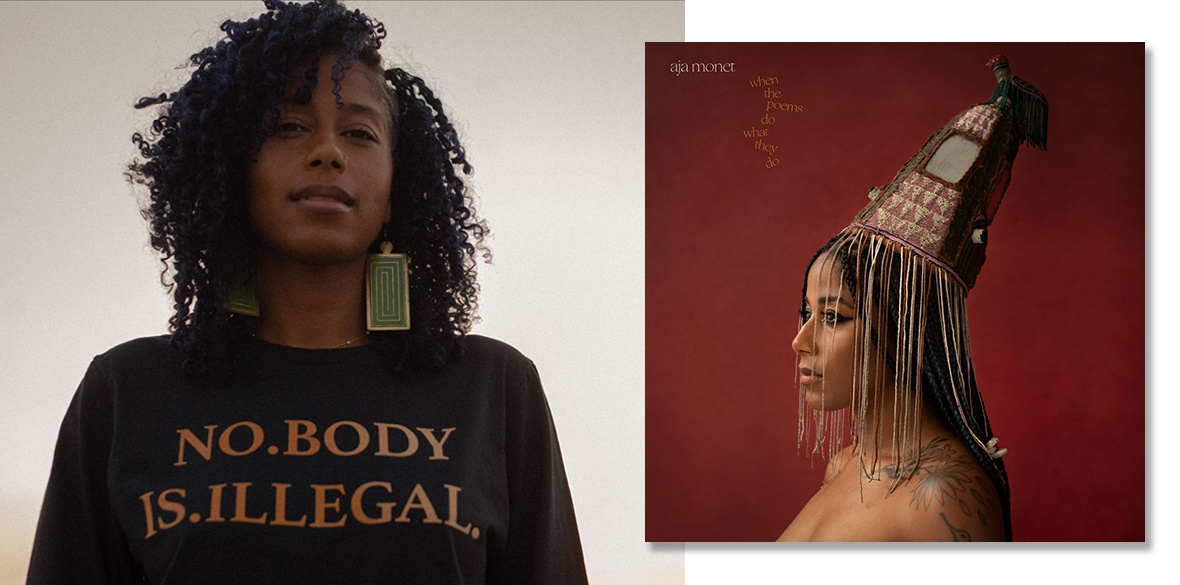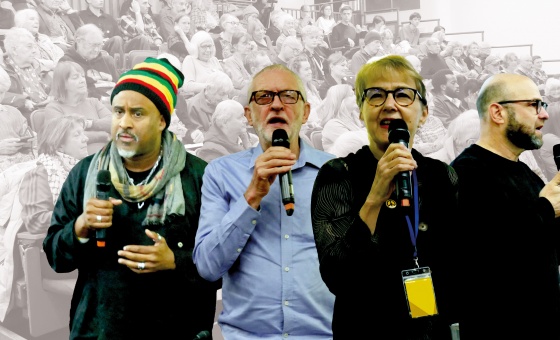This is the last article you can read this month
You can read more article this month
You can read more articles this month
Sorry your limit is up for this month
Reset on:
Please help support the Morning Star by subscribing here
“WHO’s got time for poems when the world’s on fire?” asks Aja Monet in the heart-achingly beautiful and gut-wrenchingly honest For Sonia. Her answer, it becomes clear, is that it is precisely when the world’s on fire that the movement, such as it is, needs the nourishment that poetry provides.
But Monet will not offer words to comfort and soothe at the expense of truth. “These days it hurts to write,” the track continues, “Every sentence is a false promise.”
Her debut album, 2023’s outstanding When The Poems Do What They Do, is a phenomenal emotional journey about struggling to remain human in today’s collapsing world. Joy, pain, celebration, grief, triumph, bewilderment, love, disappointment, hope, and the struggle against hopelessness: it is all there, over an intricate soundscape that in turns rises, throbs and challenges like its subject matter.
Monet’s music has the healing quality that comes with the blues: expressing the pain in order to move through it. Did the church have any influence on the young Monet?
“As I became a teenager, I spent a lot more time in the church,” she says. “I was grappling with some of the issues in my life and in my family — and church, and the relationship to God, was the place that I needed to go to to resolve things that did not make sense or that felt unjust. The church was a cornerstone for so many reasons. It’s one of the few places where music is potent in terms of the truth and the authenticity of the expression — it’s not about bravado, or ego, or how cute you look, or how well you’re speaking, or how amendable you are to people’s feelings. It’s about conveying the depth and the full expression of God and all of its complex sentiments and realities.
“And that is something you can find in every walk of African life. African spirituality is crucial to who we are and how we make music and what we do; when I think of the church, and my time in the church, I think of African spirituality.”
But then: “As I became older I became more politicised. Whilst, yes, God could help, there were systemic things that were put into place to make it impossible for us to take care of those things. One becomes transformed by that education — it is no longer just you and your problem; now it becomes a collectivised issue that we must organise around, and learn the ways that we can combat it, and shift and change it. At least that was my hope.”
From an early age, Monet began to throw herself into that organising. She is, for example, a long-term participant in the Palestine solidarity movement. What about the connection between the black radical tradition in the USA and the Palestine liberation movement?
“There is a real strange obsession with romanticising oppressed people’s connections within our struggle,” she replies. “The reason it is important to be in solidarity with Palestine is not because I’m a black person in America that knows what it is like to deal with oppression — it is just what is decently humanly right. This isn’t a discussion about perspective; there is no angle other than the truth, and the truth is, people deserve basic human decency and shelter and education and protection and the right to self-determination and to their land. I don’t see it any other way. It’s not about being white or black or Palestinian or African; it’s just right or wrong.
“I get a little annoyed,” she continues, “that we continue to try to use identity politics to pull people in because I just don’t know how the human heart will survive that sort of insult to character and to common sense. I am disgusted with the fact that people are clinging to their flags, their skin colour and their tropes around who they think they are and who they want to be — in spite of, and at the expense of, the genocide that’s taking place, not just in Palestine, but in the Congo and in Sudan.
“It’s just preposterous, it literally disgusts me. Am I part of my tradition and part of the legacy of the African people who have tried to stand up and to do what’s right? For sure. But at this point — come on now.”
Where does she find hope today?
“I don’t know if I am inspired by humans of late. I feel less entitled to believe that it is just humans alone who will shift the conditions of our reality. There are other kinds of intelligences, other kinds of information that we must listen to and adhere to and that’s what is inspiring me: the invisible, the unlanguageable, the things that are not so much about our ego and who we are and what we are going to do to change it.
“Nature has the wisdom. The land, the earth, the air, the water, the wind, the sun, the sky — those are the places that I have seen the most change that has inspired me. When lockdown happened and everybody had to sit the fuck down and contend with themselves, more change took place across the globe than years and years of organising by humans who thought that they were the greatest agents of change. The water cleaned up, the air cleaned up — it’s fascinating what humans not doing human shit can mean for the world.
“I’m not so easily inspired these days — but music and art has kept me going. And some of the artists and cultural workers that I love inspire me because of the ways they are tapping into other realms and forms of information — and the better one can get at listening to, harnessing and facilitating that, the better we can get to be as people. So we’ll see.”
It seems to me that the politics her analysis is pointing towards is that of a more holistic — more nature-centred and less anthropocentric — form of Marxism, freed from the shackles of colonial modernity and human entitlement. A Marxism infused with African spirituality — and the blues.
Aja Monet plays the Church of Sound at St James the Great as part of the EFG London Jazz Festival on November 15. For more information see: efglondonjazzfestival.org.uk












